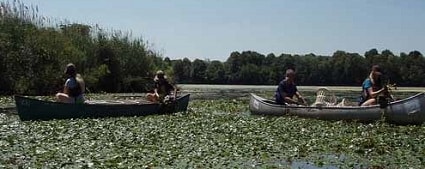Mystic River Doesn’t Need These Old Chestnuts
 Volunteers clear water chestnuts on Mystic River. / MyRWA photo
Volunteers clear water chestnuts on Mystic River. / MyRWA photo
Association clears 67 tons of invasive plants
By Jackson Schilling, YourArlington.com
Walking along the Mystic River, you are likely not to see this in the fall, but think back to summer. Did you notice a sheet of green covering the water?
These plants may look harmless, but they are an invasive species of water chestnuts that cause problems in the river.
Plants have some history
Native to Asia and Africa, these plants were brought to Fresh Pond, in Cambridge, by a gardener in the 1850s who was unaware of the problems he could cause, a brief history of the issue says. The water chestnuts are so thick and plentiful that they block boaters from passing through. They also hinder the growth of native plants and lower the dissolved oxygen levels, which can lead to fish kills, said Beth MacBlane, outreach and communications director for the Mystic River Watershed Association (MyRWA).
The Arlington-based environmental group is addressing the issue head-on — with fleets of volunteers in canoes removing water chestnuts. The group organized 22 events with 835 volunteers between June and September to harvest the invasive species by hand, said Herron, the executive director of the association, who came on board in September.
MacBlane explained how the removal works: Volunteers board canoes and kayaks, pull out the plants and pack them into nets. After they are removed from the river, they are sent away to a composting facility to be disposed of in an environmentally friendly way.
Clearing waterways
Within a few hours, the previously green mat of plants turns into clear water. Throughout the past summer, they have removed 134,800 pounds of plant material, including 67 tons of water chestnuts, the watershed group reported.
Even with all this volunteer support, the MyRWA found that it was necessary to hire mechanical harvesters to remove water chestnuts more efficiently. Funded by The state Department of Recreation & Conservation and the City of Medford, these mechanical harvesters have been making progress since 2011, MacBlane said.
Mystic River was not the only victim of this unwanted plant in greater Boston. Other bodies of water in Arlington, including Alewife Brook and Spy Pond, were once plagued by this species, but volunteers have reduced it from these areas.
MacBlane said that although the water chestnuts have been minimized in this area, the plant’s seeds can be transported here by catching in feathers of birds and dropping back into the water.
David White of Arlington and Reservoir Committee, part of the town’s Vision 2020 volunteer effort, are using the combination of volunteers and mechanical harvesting to combat the problem at the Arlington Res, near Lowell Street.